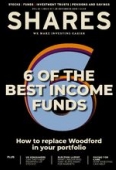Archived article
Please note that tax, investment, pension and ISA rules can change and the information and any views contained in this article may now be inaccurate.
Should regulators be doing more to help investors?

On 25 November ride-hailing app Uber became the latest company to feel the bite of the regulator as Transport for London withdrew its licence to operate in the capital.
We have previously written about the growing trend for regulatory bodies to bare their claws where they see corporate failings or wrongdoing.
Uber’s shares dropped an initial 4% in response to the TfL decision, unsurprisingly as London is its largest European market. It will likely appeal and can continue to operate while it does so.
The company fell foul of the authorities on safety grounds. Public health and safety also lies behind the increasingly tight leash on so-called ‘sin’ stocks which we discuss in an article this week.
Elsewhere, technology and social media firms have faced push-back over their use of our data, threatening their ability to continue making as much money out of our personal information.
Facebook, to take one example, continues to enjoy margins upwards of 40%, though these are starting to moderate.
If a company enjoys sky-high levels of profitability it is worth an investor at least questioning if these are sustainable. Typically what happens is either stiffer competition emerges, attracted by the strong returns, or if this is impossible due to barriers to entry, increasingly the regulator steps in to make sure people aren’t being exploited or ripped off.
PROTECTION FOR INVESTORS
As these examples demonstrate, consumer-facing businesses face a particular threat from regulation. Many of us will think a greater level of consumer protections is a good thing and will often benefit but investors might legitimately grumble that their own interests are not being protected as strongly as those of other sections of society.
In 2019 alone ordinary shareholders in Interserve, Debenhams and Thomas Cook have been wiped out. This is the ultimate risk of investing in individual company shares. However, even those investors who’ve trusted an expert and opted for the diversification of a fund have not been spared.
The Woodford debacle, as we discuss in this week’s feature on income funds, will leave a great many people significantly out of pocket.
However, there are signs that regulators in this area are doing more to protect investors. This includes moves to address fund liquidity issues, like those which arose with Woodford, as well as action on other issues.
So-called closet trackers are marketed as actively-managed funds but hug the index so closely in terms of stock selections they are effectively the same as buying a much cheaper product which simply looks to track an index. They have been in the crosshairs of authorities in Europe for some time and the UK looks to be catching up.
The Financial Conduct Authority (FCA) has fined Henderson Investment Funds £1.7m over its Japan and North American funds. Despite reducing active management of these collectives in 2011, and compensating institutional investors accordingly, ordinary punters faced the same charges and were not informed of the change in investment strategy. And seperately, on 26 November the FCA announced a ban on marketing unlisted mini bonds to retail investors.
Important information:
These articles are provided by Shares magazine which is published by AJ Bell Media, a part of AJ Bell. Shares is not written by AJ Bell.
Shares is provided for your general information and use and is not a personal recommendation to invest. It is not intended to be relied upon by you in making or not making any investment decisions. The investments referred to in these articles will not be suitable for all investors. If in doubt please seek appropriate independent financial advice.
Investors acting on the information in these articles do so at their own risk and AJ Bell Media and its staff do not accept liability for losses suffered by investors as a result of their investment decisions.

 magazine
magazine








